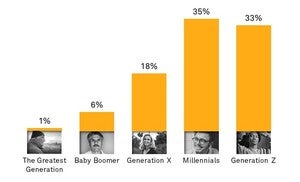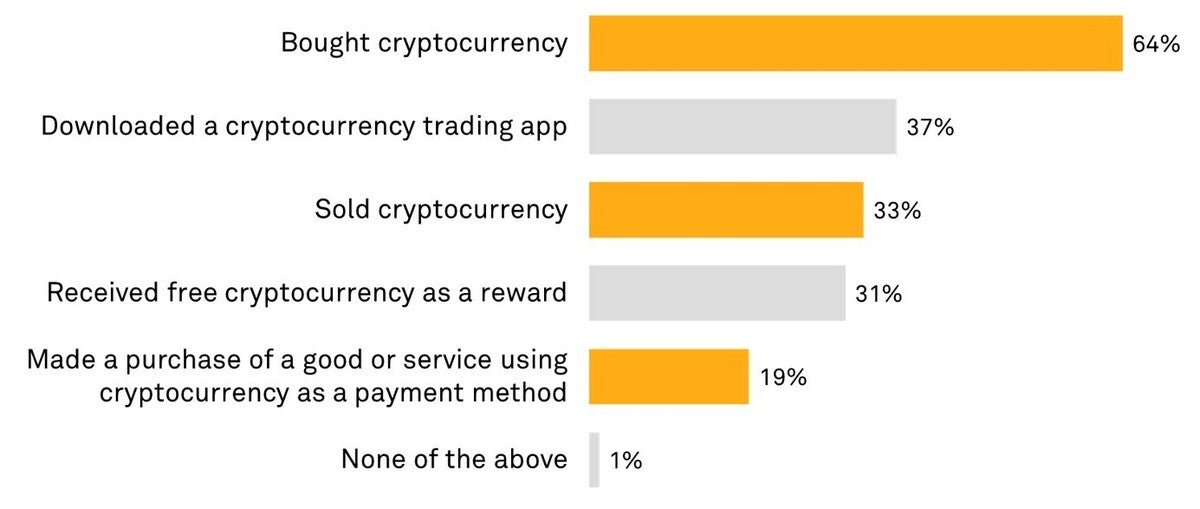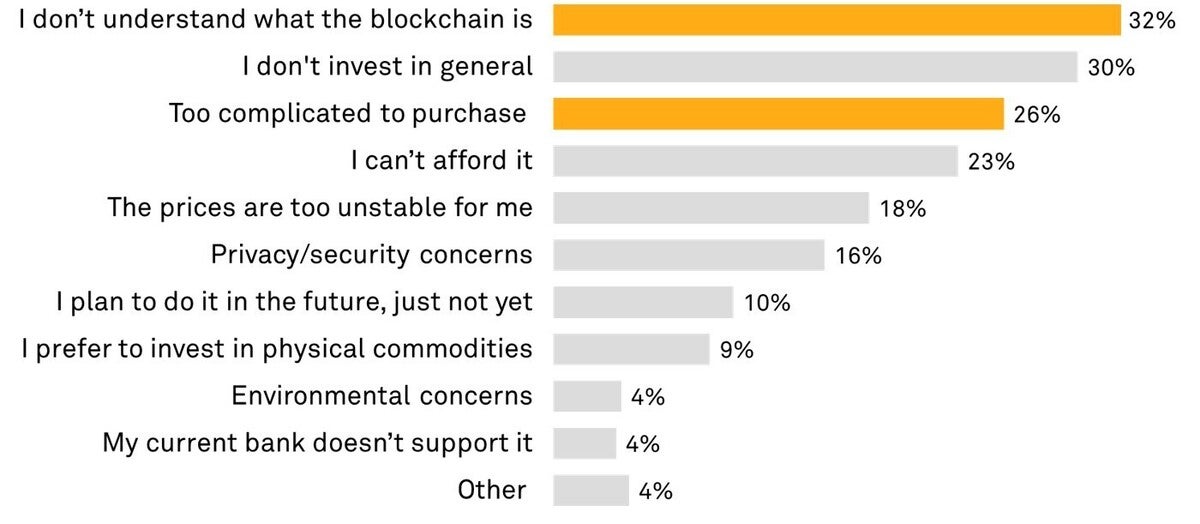































Even as the US government is moving cautiously to regulate and adopt cryptocurrency, new surveys are showing that the use of traditional financial services, such as bank accounts and cash, is already waning - especially among younger customers.
A survey released last week by global payment platform provider Thunes shed light on the shopping, social media, and money-handling habits of so-called "Zoomers" - the Gen Z generation born in the mid- to late-1990s.
The survey of people between the ages of 16 and 24 living in 13 developed and emerging countries found that Gen Zs are embracing new types of money management tools and have relatively little enthusiasm for traditional options such as bank accounts. (In fact, 62% of the respondents said they do not have one.) Mobile wallet use, by contrast, is growing fast; in some markets, almost half of Zoomers now have a mobile wallet.
The Thunes survey found mobile wallets or virtual wallets are gaining ground: in five of the 13 countries where the survey was done, mobile wallets were the most popular payment method. (Mobile wallets store information from a credit card, a debit card, coupons, and loyalty cards on a mobile device; they're also a critical storage component of cryptocurrency and stablecoins.)
And in a separate survey by 451 Research released March 31, 20% of respondents said they have either bought, traded, or received cryptocurrencies. The most robust adoption was among Gen Z/Zoomers (33%) and Millennials (35%), trailing off into the single digits for Baby Boomers and The Greatest Generation.
 S&P Global Market Intelligence's 451 Research
S&P Global Market Intelligence's 451 Research Have you ever bought, traded or received any cryptocurrencies (e.g., Bitcoin, Dogecoin)?
The 451 Research report said more users have bought cryptocurrency as an investment tool than used it as a payment method.
"When exploring the specific activities that cryptocurrency participants have engaged in, the message is clear: While most have bought cryptocurrencies (64%), a much smaller percentage are selling them (33%), and an even smaller percentage are using cryptocurrency as a payment method (19%)," the report said. "Essentially, most consumers that are engaging with cryptocurrency are treating it as an asset, much like they would a security (e.g., a stock)."
On Friday, US Treasury Secretary Janet Yellen weighed in on the idea of a digital dollar, saying it "could become a form of trusted money comparable to physical cash, but potentially offering some of the projected benefits of digital assets.
"Digital assets may be relatively new, but they are part of a larger trend - the digitization of finance - that has been in the making for decades," Yellen said during an event at American University. "In 1990, there were fewer than three million internet users. Now, there are about 4.5 billion, and we take for granted that many aspects of our financial lives can be managed from small internet-connected devices that fit into the palms of our hands.
Yellen also cautioned that the rise of stablecoins, a form of electronic currency pegged to government-backed cash, raises policy concerns, including those related to illicit finance, user protection, and systemic risk.
"And, they are currently subject to inconsistent and fragmented oversight," Yellen said, adding that the Treasury has worked with the President's Working Group on Financial Markets, the Federal Deposit Insurance Corporation (FDIC), and Office of the Comptroller of the Currency (OCC) to study stablecoins.
 S&P Global Market Intelligence's 451 Research
S&P Global Market Intelligence's 451 Research Regarding cryptocurrencies, which of the following have you done?
To peg their stablecoin to a dollar, most issuers back their coins with traditional assets that are safe and liquid, Yellen pointed out. That way, when a user wants to trade stablecoin back into a dollar, the company has the money to make the exchange.
"But, right now, no one can assure you that will happen. In times of stress, this uncertainty could lead to a run," she said. "This is not hypothetical."
Yellen was referring to a June 2021 run on Iron Finance's Titan token, the value of which dropped from$65 to$30 in two hours. Iron Finance later said the run was cause a few big holders selling their shares, which caused others to panic sell.
Earlier this month, US President Joe Biden issued an executive order calling for more research on developing a national digital currency through the Federal Reserve Bank, or "The Fed." Lawmakers then followed with a bill of their own, calling for the Treasury to create an electronic dollar - a virtual representation of a US dollar.
The Thunes' survey found one of the most important drivers for Zoomers considering purchase and payment methods is brand trust; it was cited as the top factor for choosing a primary payment method in seven of the 13 countries surveyed, including Western and emerging markets.
 S&P Global Market Intelligence's 451 Research
S&P Global Market Intelligence's 451 Research Why haven't you participated in trading cryptocurrency?
User experience was identified as the second most popular factor, which, in an online world, affects loyalty too.
"To many, Gen Z is a misunderstood and overlooked generation," Thunes CEO Peter De Caluwe said in a statement. "This is a generation to which 'dial-up' and 'desktop' are meaningless words and who don't just think 'mobile-first,' but live and breathe in apps, social media, digital platforms and soon - the metaverse. We should start to take this generation seriously as the revenues and strategic plans of many businesses - especially those that are relying on fast growth - are dependent on them."
The 451 Research report said that while financial institutions have largely eschewed direct participation in cryptocurrencyso far, its survey indicated several potentially lower-risk entry points, including:
The Gen. Z/Zoomers group accounts for nearly 2.5 billion people worldwide; it surpassed Millennials by population in 2019.
Mobile wallets are gaining traction in emerging markets where bank accounts have been historically difficult to access and financial exclusion is widespread. Mobile providers have led a digital payments revolution in Asia, while in Africa, the major telecom providers have offered similar digital payments solutions, the Thunes report noted.
Social media is part of Gen Z daily life and is increasingly driving their economic activity. More than nine in 10 Gen Zs say they now use social media throughout the day, and the platforms they log into continue to grow in number. Seven out of 10 in the survey indicated they have purchased products discovered on social media, such as Facebook and Tik Tok. TikTok is rapidly catching up to YouTube, Facebook, and Instagram in popularity.
The Thunes and 451 Research surveys spotlight how the world's youngest and most digitally-adept consumers are forcing change on decades-old business practices.
"Failure to recognize the imminent influence of the digitally native Zoomer could result in a once perfectly shoppable brand witnessing slipping sales," Caluwe said.
 Etiquetas calientes:
gobierno
Servicios financieros industria
Facebook
Gobierno él
Etiquetas calientes:
gobierno
Servicios financieros industria
Facebook
Gobierno él